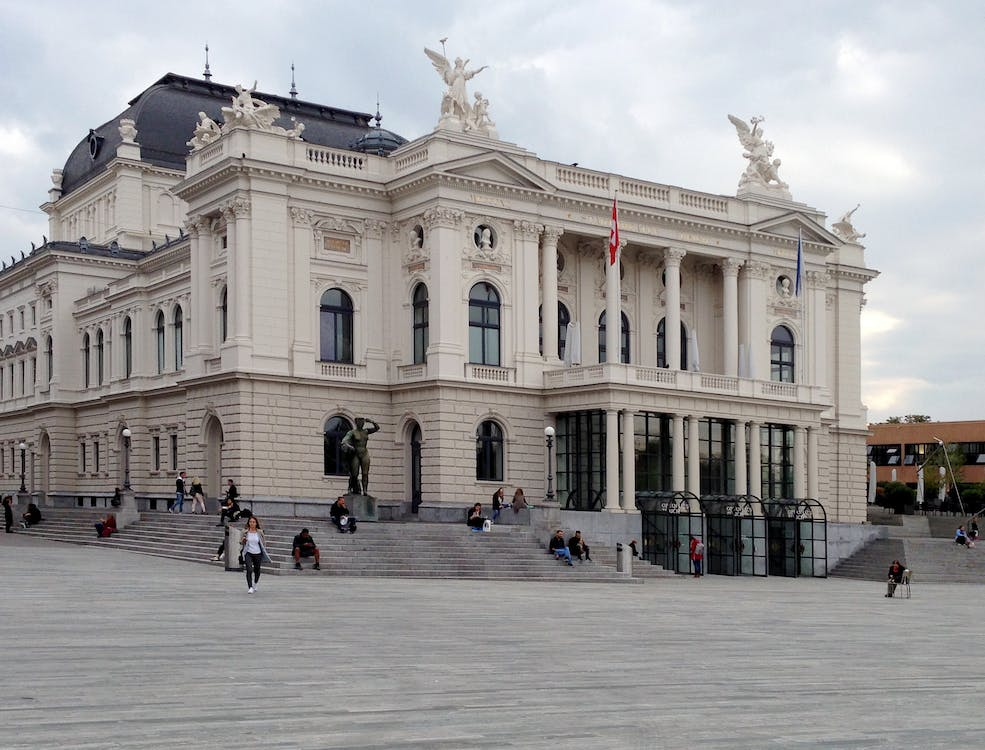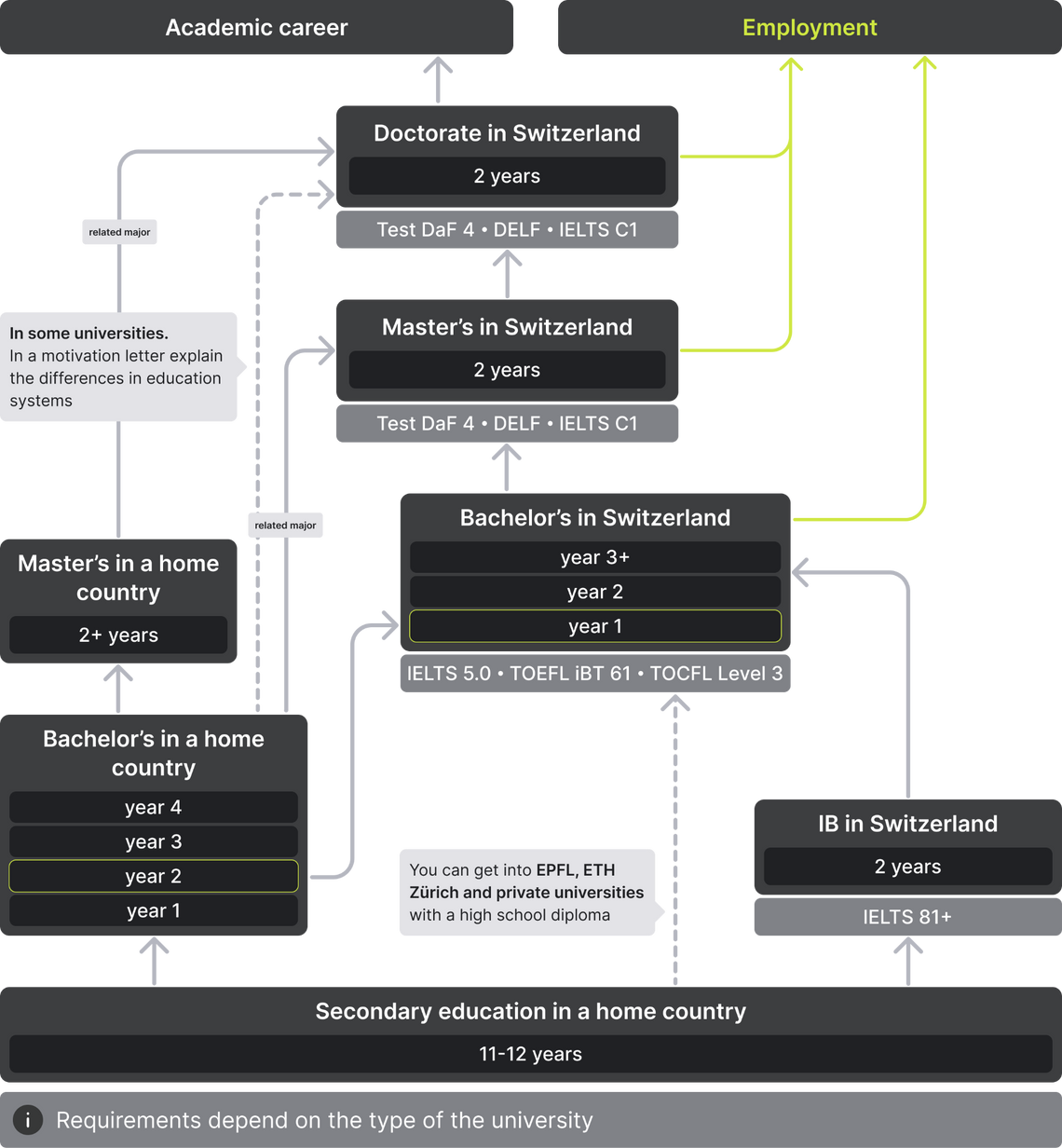Apply to a foreign university with confidence
- Properly fulfilled documents
- Perfect motivation letter
- Support from a personal mentor
- Offers from several universities
It is not usually possible to enroll at a university in Switzerland after graduating from the 11th grade, but there are exceptions. Universities in this country are autonomous. Therefore, they establish their own rules for accepting students. Some will require you to complete two years of bachelor’s study in your home country, while others only need you to pass an entrance exam.
Free consultation




It is not usually possible to enroll at a university in Switzerland after graduating from the 11th grade, but there are exceptions. Universities in this country are autonomous. Therefore, they establish their own rules for accepting students. Some will require you to complete two years of bachelor’s study in your home country, while others only need you to pass an entrance exam. Read more about these and other requirements below.
For features of higher education and universities in Switzerland, check out our separate articles.
| Program | Min. age | Duration | Min. cost/semester | Avg. cost/semester |
|---|---|---|---|---|
| Language courses | 12+ | 1-12 weeks | 329 USD/week | 1,218 USD/week |
| Bachelor's | 18+ | 3-4 years | 530 USD | 12,182 USD |
| Master's | 20+ | 2 years | 530 USD | 18,273 USD |
| MBA | 20+ | 1-1.5 years | 15,837 USD/year | 60,911 USD/year |
| PhD | 20+ | 3 years | 73 USD CHF | 2000 |
| Expense | Average cost |
|---|---|
| Student visa | 68 USD |
| Registration fee | 122-244 USD |
| Rent | 975 USD/month |
| Transportation | 305 USD/month |
| Meals | 487 USD/month |
| Insurance | 426 USD/month |
This list is for guidance only. Specify the exact costs and fees on the official website of your selected university.


In Switzerland, there are three types of universities:
Depending on your academic goals, a university of applied sciences may be more suitable for you than a traditional university (and vice versa).
In Switzerland, an important criterion for choosing a university is the language. Depending on the canton, you can study in:
While there are programs in English, only a few of them are at the bachelor’s level — about 60 out of 550 at traditional universities[1]. For master’s and PhD programs, there are many more of them — 600 out of 1500[2].
Rankings also play an important role in choosing a university. Top universities are well-known, and the chances of finding a good-paying job after graduation are higher. However, rankings should be treated with caution. For example, 40% of the QS score is the university's reputation in academia. ARWU looks exclusively at the scientific achievements of the university. As a result, ETH Zürich ranks 9th in the world according to QS[3], and only 21st according to ARWU[4].
Subject rankings may be more useful. They evaluate the performance of a university in a particular subject. According to the QS subject ranking, Universität Zürich is ranked 47th in the world in medicine[5]. ETH Zürich is in 6th place for the natural sciences, engineering, and technology[6].
Almost all traditional universities require 13 years of previous education. Therefore, students from countries with an 11-year system have to study at the bachelor’s level in their home country for 2 years. However, two Swiss federal technical institutes — EPFL and ETH Zürich — accept foreign high school diplomas, so long as you pass their entrance exams.
In Switzerland, tuition costs at traditional state universities are inexpensive even for foreigners — on average, 877 USD/semester. However, tuition may be much higher at other universities. For example, at Università della Svizzera Italiana Lugano, a foreign student will pay 4,873 USD per semester. At Universität St.Gallen, tuition fees can reach up to 12,182 USD per semester.
At universities of applied sciences, costs are also higher — 975-6,091 USD/semester.
UniPage specialists have been working with universities in Switzerland for many years. Our students study at EPFL, Berne, Lausanne, and others. We help with the selection of universities and programs based on the capabilities and interests of our clients. We know everything about foreign education and do not miss a single detail when preparing documents and writing a motivation letter.
Items 1-6 of 195
Advanced search
In Switzerland, universities determine their own admission requirements. If you decide to enter a Swiss university, contact the admissions office in advance and clarify the details.
Almost all traditional universities require 13 years of previous education. Therefore, students from countries with an 11-year system have to study at the bachelor’s level in their home country for 2 years. If you choose this route, you will need to obtain a certificate of university admission from the attended university — it indicates the name of the university, when you entered it, what program you are studying, and so on. It must be requested from the dean's office.
Applicants without this certificate must take the ECUS exam. It includes assignments in French / German, English, mathematics, history and electives. The exam is conducted once a year before the fall semester.
EPFL and ETH Zürich are an exception. These universities accept foreign high school diplomas, so long as you pass their entrance exams. At EPFL, you will be sent to the Cours de mathématiques spéciales (CMS) preparatory course after the exam[7].
However, these requirements are not valid for all countries — it depends on the particular educational system. The swissuniversities website has information for each individual nation.
In Switzerland, there are many private universities that are not accredited by the government[8]. However, many are accredited by independent organizations. For example, Les Roches is accredited by the New England Commission of Higher Education. Many of these universities are in the top world rankings for hospitality, culinary and management, and are recognized around the world. It is often possible to enter such universities after the 11th grade if you have good grades and sufficient knowledge of English.
However, some of them still set strict admission requirements. This is especially true of such prestigious institutions as Les Roches and Glion Institute of Higher Education.
Universities of applied sciences and pedagogical universities do not have uniform conditions for admission of foreign applicants. It is advised to contact the admissions committee of each university[9] and discuss the requirements specific to your situation.
In Switzerland, enrollment in medical programs at public universities is limited. They also have earlier deadlines — February 15th. It is very difficult for foreign students to enter. There are a number of restrictions for them: you must either have a residence permit in Switzerland or be a citizen of an EU country.
For admission, you need to register on the swissuniversities website. Some universities also require applicants to pass the Eignungstest für das Medizinstudium EMS entrance exam.
Depending on the canton, you will need to pass an exam in German, French, Italian, or English. This may either be a university test or one of the international exams — IELTS, TestDaf, DELF, CELI, or others.
Private institutions are focused on foreign applicants, so almost all of the courses are taught in English.
The minimum required language level is B2, but most universities require C1.
Please note that this is an approximate list of the required documents. Specify the exact requirements of a particular university on its official website.
Universities in Switzerland accept applications twice a year: for the spring and autumn semesters. But some programs only begin in the fall semester. Generally, deadlines at Swiss universities are the same, but some, such as Universität Zürich and Universität Freiburg, require applicants who need a visa to apply earlier.
| University | Bachelor’s | Master’s | PhD | |||
|---|---|---|---|---|---|---|
| Autumn | Spring | Autumn | Spring | Autumn | Spring | |
| Universität Bern | 30 April | 15 December | 30 April | 15 December | 15 October | 31 March |
| Universität Basel | 30 April | 30 November | 30 April | 30 November | 31 July | - |
| Universität St.Gallen | 30 April | - | March 31 / April 30 | 30 November | 30 April | 30 November |
| Universität Zürich | 28 February | 31 July | 28 February | 31 July | 31 July | 31 January |
| ETHZ | 30 April | - | 15 December | - | Anytime | |
| Universität Freiburg | 28 February | 30 September | 28 February | 30 September | Anytime | |
You do not need to legalize your documents to enroll at Swiss universities. When applying to a university, it will be enough to attach a notarized translation into one of Switzerland’s official languages: German, French, or Italian. For private universities, an English translation is most suitable.
Each university independently decides whether to recognize a foreign diploma. The presence of certain subjects and the prestige of the school or university where the applicant studied can play an important role in the recognition process.
If you have chosen a university of applied sciences or a pedagogical university and need an assessment of your diploma, you can contact SERI in addition to the educational institutions themselves.
In Switzerland, there are no programs like the Foundation Year. Only EPFL offers an annual Cours de mathématiques spéciales (CMS).
Therefore, applicants have to either study for 2 years at the bachelor's level in their home country, or go through one of the international high school programs:
Be sure to specify whether the diploma of such a program meets the requirements of your chosen Swiss university.
At private educational institutions, you can find Pre-Bachelor’s, Pre-Master's, and Foundation Year programs. Sometimes, they are even a mandatory part of the curriculum for foreigners.

Once you have decided to study in Switzerland, your first step is to choose a university and check its requirements specifically for applicants from your country. This can be done here. It is best to directly contact the university, explain your situation, and find out the next steps for admission.
As a rule, you need to complete 2 years of bachelor’s study in your home country to make up the difference with Swiss education.
The next step is to apply and pay the registration fee (122-183 USD) on the university website.
After the application is approved, you must submit your documents. Depending on the university, the deadlines for document submission differ: they must be attached together with the application or sent within 1-2 months. The list of required documents can be found either on the page of the selected program, or sent to you after you submit an application. Sometimes, universities ask to send physical copies by mail, for which the submission deadline is usually later.
For some countries, the required documents may include a certificate of university admission from your home country. You can easily get it from the dean’s office at your university. If you do not have this certificate, you will have to pass the ECUS entrance exam. It takes place once a year before the fall semester. The exam requirements are sent to you after your documents have been checked by the admissions committee.
Required documents depend on the specific university. The list may include:
The main requirement for future graduate students is a bachelor's degree in a related field. However, the university from which you received your degree must be accredited.
The remaining selection criteria are independently set by each university and program faculty. Some may require work experience, while others may ask you to pass entrance exams.
The application must be submitted on the website of the chosen university. After that, you have to submit your documents online or by mail. The list of required documents is usually located on the program website or sent to you after filling out an application.
Additionally, you may be asked to confirm that you were not expelled from your previous university due to poor academic performance.
Required documents may differ from university to university. Here is an approximate list:
You can study business in Switzerland at both public and private educational institutions. The requirements here are the same as those for other master’s programs, with the addition of 2 to 5 years of work experience and GMAT results.

Requirements for PhD programs are different for each program. The main one is a master's degree in a related field from an accredited university. Some universities, such as EPFL, accept applicants with only a bachelor’s degree. In this case, you must describe the special features of your previous education[10].
If your diploma meets the requirements of your selected program, prepare the necessary documents. Will you need to prepare a research proposal and pass a language proficiency test.
Then, as with bachelor’s and master’s applications, you fill out an application on the university website and submit the required documents.
You also need to find a supervisor and get their consent to oversee your research. Depending on the university, this must be done before or after you submit the required documents.
The cost of study at public universities in Switzerland rarely exceeds 2,436 USD per semester. Many students easily cover their tuition costs with part-time jobs. Nevertheless, life in Switzerland is very expensive. Education at a prestigious private university can also hurt your wallet.
Students can receive additional financial support from a university, the government, or various international companies. Grants and scholarships are mostly awarded to master’s (including MBA) and PhD students who have proven academic excellence in their previous study.
One of the most popular government scholarships is the Swiss Government Excellence Scholarship. It can be awarded to PhD students of any field, master’s students studying the arts, and researchers. It provides monthly payments of 2,339 USD and covers living expenses.
In addition, state universities in Switzerland offer Excellence Scholarships for academic performance. They are issued to both local and foreign students. Usually, only master’s students receive them. Some cover only tuition and living costs, while others pay a monthly stipend of around 1,949 USD or a one-time grant of 6,091-12,182 USD per semester.

To study at a Swiss university, you need to apply for a national category D visa. All documents must be translated into English, German, French, or Italian, depending on the canton in which your university is located. The visa application must be submitted in person at the Swiss consulate. Sometimes a test may be conducted to check the language proficiency of the applicant.
You also need to pay a visa fee of 68 USD. The application processing time is 8-12 weeks. As a rule, the validity of the visa begins 2-3 weeks before the start of the academic semester. If you need to enter the country earlier, this should be justified in your application.
For students under 18 years of age:
You must register with the local (cantonal) migration office within 14 days of entering Switzerland. You then have 90 days to apply for a temporary residence permit at the same migration office.
The residence permit is valid for 1 year. Each time you renew it, you need to confirm the availability of at least 25,582 USD to cover living costs in Switzerland.
60+ countries
we work with
$1,000,000 saved
by students through scholarships
6,400 offers
our students got